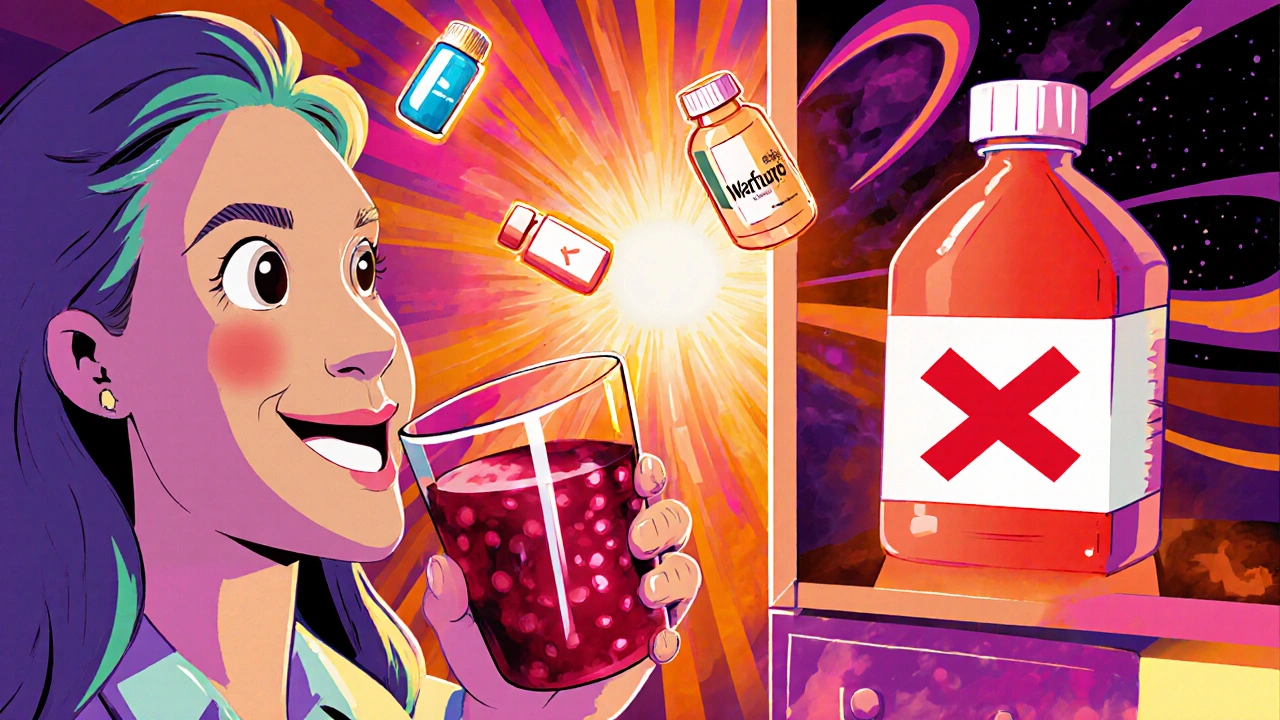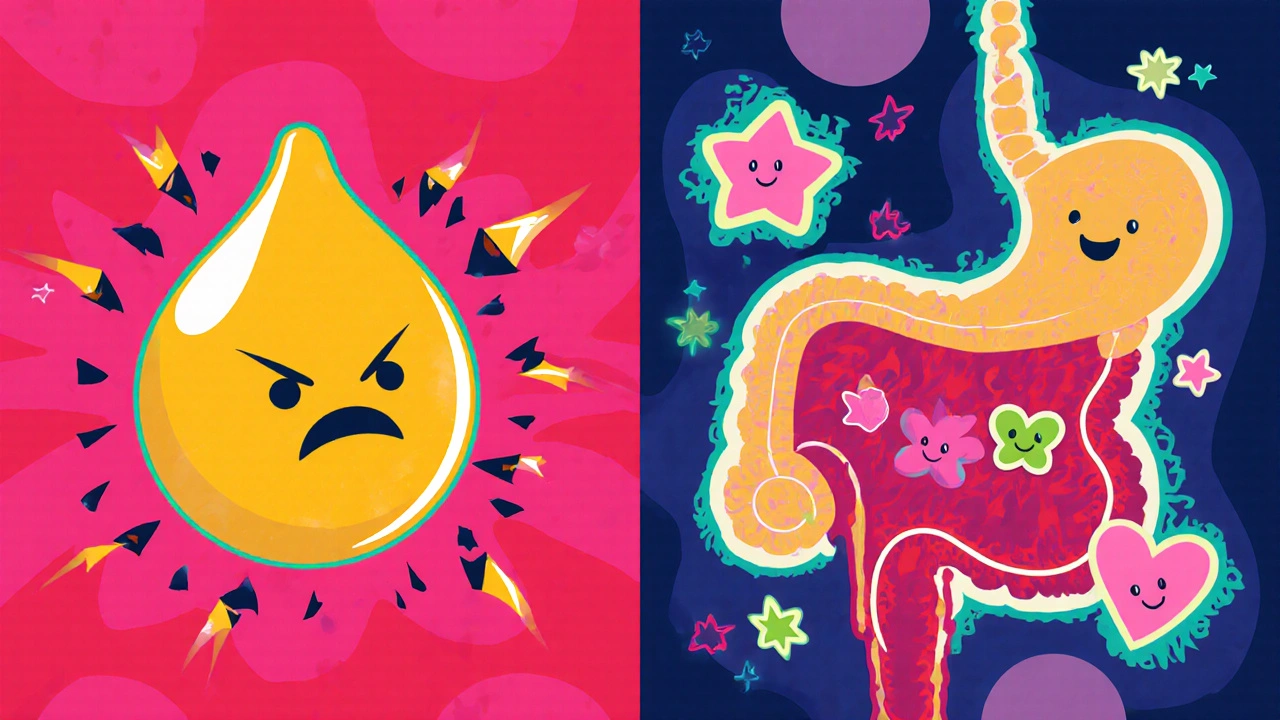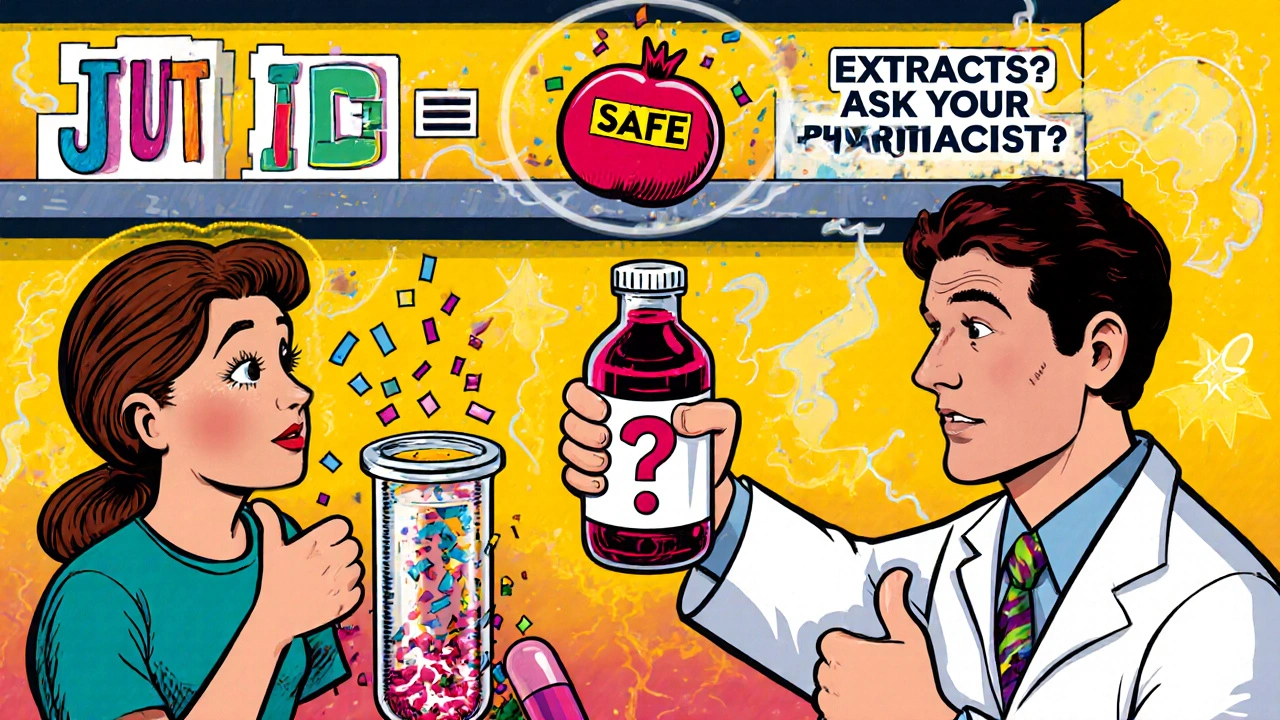Pomegranate Juice and Medications: What You Need to Know About CYP Interactions
 Oct, 30 2025
Oct, 30 2025
Medication Interaction Checker
Pomegranate Juice vs. Medications
This tool helps you understand if pomegranate juice or extract interacts with your medications based on human clinical evidence rather than lab studies.
For years, people have been told to avoid grapefruit juice if they're on certain medications. It’s a warning printed on pill bottles, repeated by pharmacists, and even posted in doctor’s offices. But what about pomegranate juice? You see it in smoothies, health stores, and juice bars - marketed as a superfood packed with antioxidants. So, if grapefruit juice can mess with your meds, shouldn’t pomegranate juice be just as risky?
The short answer? No. Not based on what we’ve seen in real people.
Back in 2005, lab studies made it look like pomegranate juice could be just as dangerous as grapefruit juice. Researchers found that in test tubes filled with human liver cells, pomegranate juice blocked the same enzyme - CYP3A4 - that grapefruit juice does. This enzyme breaks down about half of all prescription drugs. Block it, and drug levels in your blood can spike. That’s how grapefruit juice causes problems: it stops your body from clearing medications like statins, blood pressure pills, and immunosuppressants. The results from those early lab tests were alarming. Some headlines screamed: "Pomegranate Juice May Be New Grapefruit Danger." But here’s the thing: test tubes don’t have stomachs. They don’t digest. They don’t absorb. They don’t excrete. And that’s where the story changes.
Human Studies Say Something Different
Between 2007 and 2013, scientists ran real clinical trials with actual people. Not just a few volunteers - dozens, sometimes hundreds. They gave participants pomegranate juice every day for a week or more, then measured how their bodies handled common medications.
One study looked at flurbiprofen, a painkiller processed by CYP2C9. People drank pomegranate juice daily. Their drug levels? No change. Another tested midazolam, a sedative that’s a gold-standard marker for CYP3A4 activity. Same result: no rise in blood concentration. The geometric mean ratios for both drugs were almost exactly 1.0 - meaning pomegranate juice had no measurable effect.
Compare that to grapefruit juice. A single glass can boost the blood level of felodipine - a blood pressure drug - by over 350%. That’s not a small bump. That’s a risk of fainting, heart rhythm problems, even kidney damage. Pomegranate juice? Nothing close.
Why the Big Difference?
It comes down to concentration and delivery.
Grapefruit juice contains furanocoumarins - chemicals that permanently disable CYP3A4 enzymes in the gut lining. Once they’re there, they stay. Your body can’t replace them fast enough. So even if you drink grapefruit juice at 8 a.m. and take your pill at noon, the enzyme is still knocked out.
Pomegranate juice? It has different compounds - mainly punicalagins and ellagic acid. These might inhibit CYP enzymes in a petri dish, but they don’t survive digestion well. They’re broken down, diluted, or absorbed too slowly to reach the gut wall in high enough concentrations to matter. Even if you drink a full glass every day, the levels just don’t stack up.
And here’s another key point: the liver handles most of the drug breakdown after absorption. Grapefruit juice blocks the gut enzyme before the drug even enters your bloodstream. Pomegranate juice doesn’t. So your liver still does its job.
What About Warfarin? I Heard It Can Increase Bleeding Risk
Warfarin is metabolized by CYP2C9 - the same enzyme some early studies thought pomegranate juice might block. That’s why people worry.
But here’s what the data says: in multiple human trials, pomegranate juice did not affect warfarin levels. One patient on Drugs.com reported drinking pomegranate juice daily for six months while on warfarin. Their INR - the measure of blood clotting - stayed perfectly stable between 2.0 and 2.5. No spikes. No hospital visits.
There was one case report from 2017 where a patient’s INR rose after taking a pomegranate extract - not juice. That’s important. Extracts are concentrated. They’re like drinking 10 pomegranates in a pill. Juice is not the same. You’d have to drink a gallon a day to get close to the dose in those extracts. And even then, there’s no proof it causes problems.
Pharmacists on Reddit were asked: "Do you warn patients about pomegranate juice like you do grapefruit?" Out of 47 responses, 42 said no. "I’ve had cases where grapefruit caused bleeding with warfarin," one pharmacist wrote. "I’ve never seen it with pomegranate."

Regulators and Experts Agree
The FDA doesn’t list pomegranate juice as a drug interaction risk. The European Medicines Agency doesn’t either. The University of Washington’s Drug Interaction Database - one of the most trusted sources - gives pomegranate juice a "B" rating: "Moderate evidence against interaction." Grapefruit juice? "A" - strong evidence for interaction.
Dr. Stephen M. Stahl, a leading psychopharmacologist, put it bluntly in a 2014 article: "The risk of a pharmacokinetic interaction is negligible if pomegranate juice is consumed by patients receiving CYP2C9 substrates."
Yet many doctors still get it wrong. A 2016 survey found that 68% of physicians mistakenly believed pomegranate juice required the same restrictions as grapefruit juice. That’s not just outdated - it’s causing unnecessary fear.
Patients are cutting out healthy foods because they think they’re dangerous. They’re confused. They’re stressed. And it’s not based on evidence.
What About Supplements? Pomegranate Extracts Are Different
This is where things get tricky.
Pomegranate juice is safe. But pomegranate extract? That’s a different story. Extracts are concentrated. They’re sold as capsules, powders, or tinctures. They can contain 10 to 50 times more active compounds than juice. And we don’t have enough human studies on them.
A 2022 review in Clinical Pharmacokinetics pointed out that while juice shows no risk, "pomegranate extract warrants further investigation." The NIH even gave a $2.4 million grant in 2023 to study how these extracts affect intestinal transporters - not just enzymes.
If you’re taking a pomegranate supplement - especially if you’re on a narrow-therapeutic-index drug like warfarin, cyclosporine, or tacrolimus - talk to your doctor. Don’t assume it’s safe just because the juice is.

What Should You Do?
Here’s the simple, practical advice:
- If you’re drinking pomegranate juice - no need to stop. It’s fine with most medications, including statins, blood pressure meds, and blood thinners.
- If you’re taking a pomegranate extract - ask your doctor or pharmacist. Don’t assume it’s safe.
- If you’re on grapefruit juice - keep avoiding it. The risk is real, proven, and dangerous.
- Don’t confuse the two. Juice ≠ extract. One is a beverage. The other is a supplement.
And if your doctor tells you to avoid pomegranate juice, ask: "Is that based on lab studies or human trials?" If they say "lab studies," they’re working with outdated info.
There’s a reason the American Society for Clinical Pharmacology and Therapeutics issued a position statement in 2015 saying pomegranate juice doesn’t need restrictions. Because the science is clear now. The fear was real. But the risk? Not there.
Drink your pomegranate juice. Enjoy the tart sweetness. It’s good for you. And unless you’re swallowing a concentrated capsule, you don’t have to worry about your meds.
Why This Matters Beyond Just Juice
This isn’t just about pomegranate. It’s about how we make decisions in medicine.
We’ve all been trained to fear anything that looks dangerous in a test tube. But biology is messy. What works in a dish doesn’t always work in a body. That’s why we need human data - not just lab results.
Grapefruit juice is a textbook example of a real, dangerous interaction. Pomegranate juice is a textbook example of how science corrects itself. We saw the early warning. We tested it in people. And we found out the truth.
That’s how medicine should work. Not by panic. Not by assumption. But by evidence.
Can I drink pomegranate juice while taking statins?
Yes. Unlike grapefruit juice, pomegranate juice does not interfere with statins like atorvastatin, simvastatin, or rosuvastatin. Multiple human studies show no increase in drug levels or risk of side effects. You can safely enjoy pomegranate juice with your cholesterol medication.
Does pomegranate juice affect blood pressure medications?
No. Studies using medications like amlodipine, felodipine, and verapamil show no clinically significant interaction with pomegranate juice. Blood pressure remains stable, and drug concentrations don’t rise. You can drink it without concern.
Is pomegranate juice safe with warfarin?
Yes, if you’re drinking the juice. Human trials show no effect on INR levels. However, avoid pomegranate extracts or supplements - these are concentrated and haven’t been studied enough. Stick to juice, and monitor your INR as usual.
Why do some sources say pomegranate juice is dangerous?
Early lab studies in test tubes suggested strong enzyme inhibition. But those results didn’t translate to humans. Many websites and outdated guides still repeat the initial warnings. Always check if the source cites human clinical trials - not just petri dish experiments.
Should I avoid pomegranate juice if I’m on multiple medications?
If you’re drinking regular pomegranate juice, there’s no need to avoid it, even with multiple medications. The evidence shows it doesn’t interfere with CYP3A4 or CYP2C9 enzymes in the body. But if you’re taking supplements, extracts, or concentrated powders, talk to your pharmacist - those haven’t been studied as thoroughly.
Oliver Myers
November 1, 2025 AT 03:21Finally, someone laid this out clearly-thank you for cutting through the noise. I’ve had patients quit pomegranate juice because their doctor told them to, and then they’d come back frustrated because they missed their morning smoothie. It’s not just about meds-it’s about quality of life. This is exactly the kind of evidence-based clarity we need more of.
Alex Sherman
November 2, 2025 AT 01:03How is it that people still don’t get that lab studies are just the *starting point*? If we followed every in-vitro result, we’d be avoiding air, water, and sunlight. Pomegranate juice is a beverage, not a pharmaceutical. The fact that this even needs explaining says something deeply wrong with how medical information is disseminated.
John Concepcion
November 3, 2025 AT 14:58Lol so now we’re trusting human trials over test tubes? What’s next? Maybe we should stop warning people about peanut allergies because one guy ate 3 peanuts and didn’t die? You’re just giving people permission to be dumb.
Caitlin Stewart
November 4, 2025 AT 17:52I’m so glad this post exists. My mom’s on warfarin and she was terrified of pomegranate juice-she’d only drink it on Sundays, like it was a sin. When I showed her the studies, she cried. Not because she was scared, but because she realized she’d been denying herself something she loved for no good reason. Thank you for helping people feel safe again.
Emmalee Amthor
November 5, 2025 AT 16:02science is beautiful when it corrects itself… but also terrifying when it takes 15 years for the public to catch up. we live in an age where a 2005 petri dish result still haunts grocery store signs. the real danger isn’t the juice-it’s the laziness of institutions to update their warnings. we need better systems, not just better science.
Leslie Schnack
November 6, 2025 AT 06:02What about the metabolites? Do we know if the breakdown products of punicalagins in the gut could have any delayed or cumulative effect? I’m not saying it’s dangerous, but… has anyone looked at long-term daily consumption over 5+ years?
Saumyata Tiwari
November 6, 2025 AT 17:07Of course Americans think juice is harmless-your entire healthcare system is built on ignoring real science and chasing trends. In India, we’ve known for centuries that concentrated fruit extracts can alter physiology. You’re just now realizing your ‘natural’ products aren’t always safe? Pathetic.
Anthony Tong
November 8, 2025 AT 05:00Who funded these ‘human trials’? Big Juice? The FDA? The same people who said cigarettes were safe? Don’t be fooled. The pharmaceutical industry benefits from keeping people afraid of natural alternatives. This is a carefully orchestrated narrative to push pills over produce.
Roy Scorer
November 9, 2025 AT 20:18It’s not about the juice, is it? It’s about control. We’re being conditioned to distrust our own bodies-to outsource every biological function to a pill, a warning label, a doctor’s permission slip. Pomegranate juice is just the latest symbol of autonomy being stripped away under the guise of safety. We’ve forgotten how to listen to our own physiology.
Ajay Kumar
November 9, 2025 AT 21:28You’re all missing the point. The real issue isn’t whether pomegranate juice interacts with CYP enzymes-it’s that we’ve built an entire medical infrastructure around oversimplified metabolic pathways. The body isn’t a test tube, sure, but it’s also not a linear system. Enzyme inhibition isn’t binary. There are compensatory mechanisms, tissue-specific expression, genetic polymorphisms in CYP2C9, gut microbiome variability, and bioavailability differences across individuals. You can’t just say ‘no interaction’ and call it a day. That’s reductionist thinking. What about people with liver disease? Elderly patients? Those on polypharmacy? The data you cite is population-level. Individual risk? Still unknown. And you call that science? That’s just statistics pretending to be wisdom.
Oliver Myers
November 10, 2025 AT 11:34That’s a really thoughtful point, Ajay. And you’re right-population data doesn’t tell the whole story. But here’s the thing: even in vulnerable populations, no serious adverse events have been reported in clinical settings. If there were real individual risks, we’d see them in pharmacovigilance databases. We’ve had millions of doses consumed. Zero confirmed interactions. That’s not luck-it’s evidence. We don’t need to fear the unknown when the known is this clear.